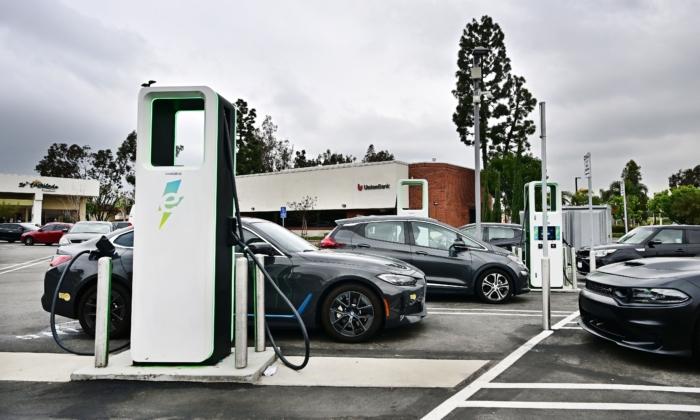Commentary
In a
recent article published in The Defense Post, Retired Lt. Gen. E.G. “Buck” Shuler Jr., former commander of the U.S. Strategic Air Command’s Eighth Air Force, raises the alarm that new Environmental Protection Agency tailpipe emissions standards designed to force U.S. car manufacturers to stop selling gas-powered cars in favor of electric vehicles (EVs) put the United States at the mercy of China.
Mr. Schuler is absolutely right. China controls the vast majority of raw and manufactured materials needed to build EVs. China also dominates the global market for solar panels, which the Biden administration is pushing as a key renewable energy source that will provide the electricity needed to power EVs with questionable environmental benefits.
Just as China “
dominates” rare earth element mining and refining and manufacturing of defense-critical rare-earth-based permanent magnets, the House Committee
on Energy and Commerce reported “that China controls 90% of the EV supply chain in aggregate” and that “any push to make EVs the dominant type of vehicle on the market would essentially hand China the keys to America’s auto future.”
Unsurprisingly, communist China, taking note of the West’s panic-stricken, ineffective measures to control greenhouse gas emissions, shrewdly made heavy government-subsidized investments into EV-related manufacturing that made it far and away the world leader in EV sector initiatives.
Playing right into the Chinese Communist Party’s (CCP’s) hands, President Joe Biden’s new executive order, described by The Wall Street Journal as “fanciful,” mandates that 50 percent of all cars sold by 2030 be electric vehicles.
Not only are these mandates unrealistic and unattainable, but trying to achieve them will be a disaster for our
economy and will help China surge ahead in nominal gross domestic product (GDP), as well as widen its lead in purchasing power parity GDP. The rationale for such mandates appears to be more driven by ideology than science.
President Biden’s new executive decree will add tens of billions of dollars of annual losses to the billions of dollars of losses that U.S. manufacturers have already suffered in building EVs.
Case in point:
Ford Motor Co. recently revealed that it lost $1.3 billion in the first quarter of 2024 and expects to lose $5 billion for the full year of EV sales. With no way to make building and selling subsidy-free EVs profitable in the short to medium term, the Biden administration’s policies ensure that U.S. auto manufacturers will continue to bleed tens of billions of dollars each year as long as these feel-good, disastrous mandates remain in place.
Adding insult to the injury of crippling the economy to address a
nonexistent climate emergency is the fact that EVs don’t net out to be all that environmentally friendly.
Truth be told, unlike hybrids with their smaller batteries, full EV cars—
with their massive batteries whose manufacture generates a huge amount of carbon dioxide—generate a larger carbon footprint over their life than most gas-powered cars. When you factor in the damage done to the environment by
using child labor to mine materials such as cobalt to make the batteries, it turns out that heavy,
more dangerous EVs do far more damage to the environment than the average gas-powered car.
With EVs being as much as 30 percent heavier than comparably sized gas-powered cars, they cause
more damage to roads, resulting in more energy being used to maintain roads. They also add to their carbon footprint by wearing through their tires more quickly and putting
more toxins into the air.
Adopting EVs will require expanding our electric power generation by a whole lot. In California alone,
CALMatters estimates that going to 100 percent EVs by 2035 will require tripling electric power generation. If that additional electric power generation is going to come from “renewables,” then California must deploy wind and solar power at five times the pace of the past decade.
Renewables will require expensive new power lines to connect them to the grid and massive battery banks to have any chance of matching the reliability of environmentally friendly
natural gas-powered or nuclear-powered electric generation plants.
Then, toss in the cost and effort to dispose of and recycle
toxic solar panels, windmill blades, and spent batteries, and President
Biden’s executive order to promote “Clean Cars and Trucks” is beginning to look downright dirty.
Meanwhile, in a move seemingly designed to make it even harder to achieve the already unrealistic goals, the Biden administration has “cleverly” proposed
cutting subsidies for U.S.-manufactured vehicles containing Chinese-made battery components even though replacements for such components are limited and much more expensive.
Assuming that there is the will and the money to do so, developing alternative channels and sources for critical EV components could take more than a decade. Further, China is building EV-related
plants in Mexico that likely will be exempted from any effects that Biden policies may have on limiting the Chinese regime’s control over EV components going into U.S. cars.
All of this brings us to this question: Given all the saber rattling and the panicked calls to ramp up defense spending to counter the CCP threat, why would President Biden be pushing a policy that
helps the Chinese regime and damages national security by forcing U.S. consumers to buy cars
they don’t want?
Views expressed in this article are opinions of the author and do not necessarily reflect the views of The Epoch Times.






